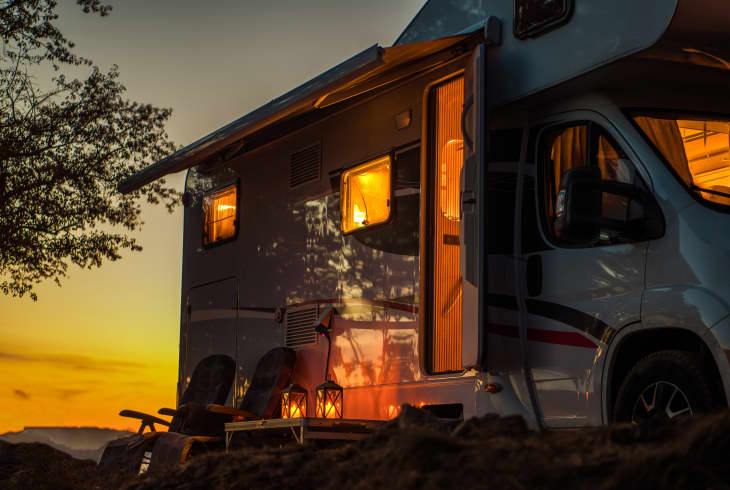5 Things to Know About Living in an RV, According To People Who Have

So you want to live in an RV? It may seem fun, but you shouldn’t take it lightly. It’s a stark change for most people. Here are some tips you need to know about living in an RV, or recreational vehicle, straight from people who’ve done it.
You can’t escape the people in the RV with you—and that’s a good thing.
Ashley Petrone lived in an RV with her husband and three children for just over a year, and quickly learned exactly how difficult it is to escape an irritating situation.
“You can’t run away or hide from arguments or problems,” she says. “I remember one argument [with my husband], I was so mad that I stomped off to the other side of the RV and realized, crap, there’s nowhere to go. We both started laughing. There is no escape from one another.”
But she and Jonathon Longnecker, who lives in his RV full-time with his wife and four children, both agree this isn’t a bad thing. Living in such a confined space changes how you troubleshoot and solve problems together, and makes communication even more meaningful—it makes you closer to the people you’re with.
You will turn into a minimalist.
The National Fire Protection Association’s guidelines say the maximum RV size is only 400 square feet, and most are much smaller. Petrone’s, for example, was only 180 square feet—and that doesn’t leave a lot of living space. You’ll evaluate how much you need material things. Who needs an ice cream scooper when you can use a spoon? Why have four plates per person when just one will do?
“Each little thing adds up and makes the RV feel smaller and smaller,” Petrone says. “To give you freedom and space inside, keep it minimal.”
You’ll fight with your appliances.
Before getting into an RV full-time, it’s important to realize that the appliances and systems you use aren’t the easiest things to work with.
“Anything you know about a house isn’t going to help you too much,” Longnecker says. “You really have to understand what’s going on in your RV.”
Just a few examples of things Longnecker and his family learned along the way: RV ovens are picky and you have to cook slower at a lower heat, refrigerators take longer to get back to being cold if someone has left the door open too long, and tank water heaters don’t heat enough water for more than a couple of people.
You’ll also need to get used to the different systems used to power your home. Their first night out, Longnecker and his family killed their RV battery by running three fans all night.
“We had no frame of reference for how much power was going to be used and how much we had available,” he says. And that’s something you’ll need to learn for all the systems, including electrical, water storage, plumbing, heating, and cooling.
You’ll become a mechanic.
RVs break a lot, and depending on where and when you are, repair shops may not be nearby or even open. Be prepared to read all your manuals and learn how to fix your own problems. (Longnecker says to take special note of your axles and tires—they’re often poor quality and will break quickly.)
You will change as a person.
Moving into an RV is a total lifestyle switch. It will challenge you and help you grow as a person. Both Longnecker and Petrone say that it made them (and their families) much more adventurous, and helped them to get along better, have a stronger bond, and grow as people.
“It changed the way we look at everything in our lives,” Petrone says.
